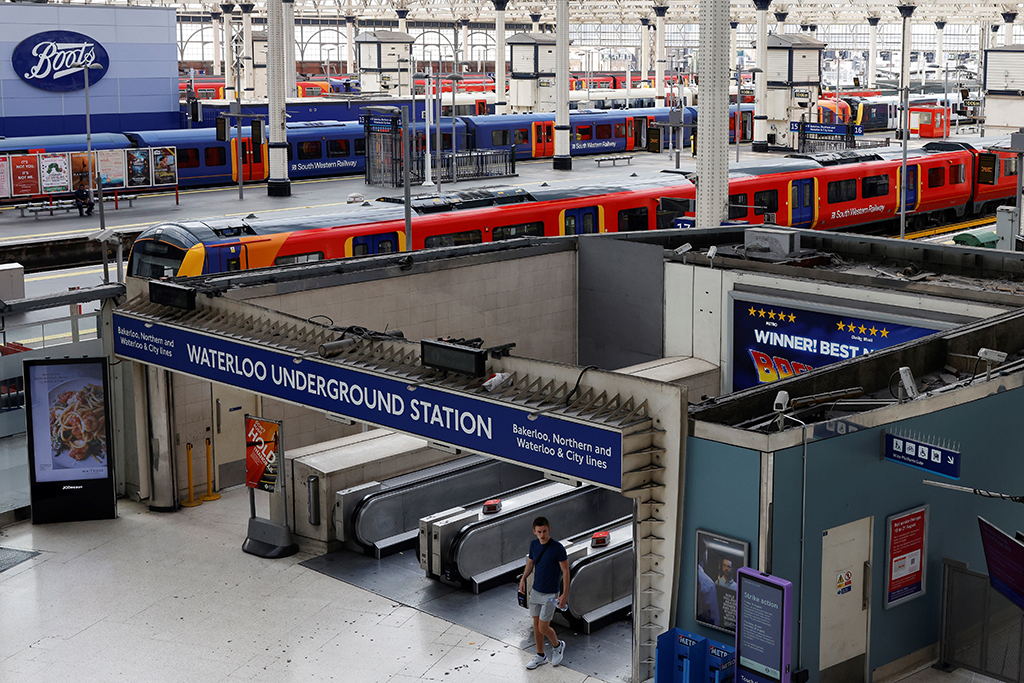LONDON: Railway staff in Britain on Saturday staged the latest in a series of strikes, the second in three days, as decades-high inflation hit salaries and prompted walkouts across various industries. The stoppage by tens of thousands of workers disrupted weekend leisure travel with only around one in five trains set to run and some areas having no services.
It comes during a summer of industrial action across Britain, with staff in various sectors pushing for pay rises and better working conditions. "We cannot tolerate being bullied or hoodwinked into accepting a raw deal for our members," said Mick Lynch, general secretary of the Rail, Maritime and Transport union (RMT), which is among those striking. "The government needs to stop their interference in these disputes so the employers can come to a negotiated settlement with us."
He warned that further walkouts were likely unless a compromise could be reached over pay rises and working terms and conditions. However, Transport Secretary Grant Shapps said the unions' "coordinated approach" showed they were "hell-bent on causing as much misery as possible".
Saturday's stoppage, set to hit football and cricket fans headed to matches as well as festival-goers, tourists and holidaymakers, will spill over into Sunday morning. It follows a similar walkout Thursday, and a strike across London's transport system on Friday.
Official data Wednesday showed UK inflation at a 40-year-high above 10 percent, as soaring food and energy prices hurt millions. The Bank of England has forecast inflation to top 13 percent this year, tipping the British economy into a deep and long recession. The rail strikes have divided opinion, with some voicing frustration but others supporting the workers.
"I've got all the sympathy in the world for them," recruitment consultant Greg Ellwood, 26, told AFP this week at an unusually quiet Euston station in London. "Everyone likes to try and divide people, but this is something I think people should stick to."
Public transport workers in London held fresh strikes Friday over pay and conditions, cutting services on almost all underground and overground rail lines that link up the UK capital. The latest walkout comes during a summer of industrial action across Britain, with workers in various sectors pushing for pay rises in line with decades-high inflation and the soaring cost of living.
A spokesperson for Transport for London, responsible for most of the capital's network, told AFP there were "almost no tube (Underground) services" with only a couple of lines functioning with "very reduced services". Members of the RMT transport workers union, which represents a majority of the workforce, called Friday's strike over job cuts, pension security, pay and changes to working practices.
Passengers outside the closed Blackhorse Road underground station expressed frustration at long detours or costly taxi rides they would have to take. "I'm not happy at all about this strike. I didn't think much about what they're claiming. I'm more focused about how I'm going to get to work now," said Arlene Morson, a 52-year-old sales consultant.
"It's happening almost every week now, something has gone wrong," said Greg Skalski, a 43-year-old construction worker, adding he had little sympathy given that train drivers earn higher than average salaries. French finance worker Joachim, 21, was more relaxed, saying: "When I look at France and the number of strikes-here the metro closes for one day and everyone talks about it!"
The strike action comes after nationwide rail strikes on Thursday hit the majority of services, as union members have rejected an eight percent pay rise offer that is below inflation. There will be further nationwide rail strikes on Saturday. The RMT has refused to put an end date on the industrial action.
London Mayor Sadiq Khan, an opposition Labour politician, told Sky News he did not back strike action but understood why transport workers are "frustrated and worried", saying the government "shouldn't be punishing hardworking transport workers." The government has taken a tough line on strikes, vowing not to participate in talks. Transport minister Grant Shapps told Sky News that ministers want to push through modernization that the RMT union opposes, including on Sunday working.
He complained that unions were blocking a pay offer from Network Rail, which manages the rail network, that would increase salaries by eight percent over two years without consulting members. Opposition Labour leader Keir Starmer tweeted that "Shapps could resolve these strikes by getting round the table and doing his job." - AFP











